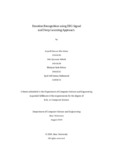Emotion recognition using EEG signal and deep learning approach
Abstract
Emotion is a mental state, which originates in the brain and is closely related to the
nervous system. Emotion can be defined as a feeling expressed through, or detectable
by voice intonation, facial expression body language, as response from one’s mood relationship
with others and most importantly the circumstance they are in. Although,
Brain Computer Interface (BCI) are being developed to find a better human-machine
interaction system using brain activity and it is frequently implemented by Electroencephalogram
(EEG) signals. EEG is a well established approach to measure the brain
activities which can be analyzed and processed to distinguish different emotions. In
this thesis, we present an approach to classify human emotions using EEG signal by
Convolutional Neural Network(CNN). In our model, we use the Dataset for Emotion
Analysis using Physiological signals (DEAP) dataset, a benchmark for emotion classification
research, to transform the EEG signal from time domain to frequency domain
and extract the features to classify the emotions. Emotion can be classified based on
the two dimensions of valence and arousal. Previous researches have used fewer channels
and participants. Our approach which was carried out on 32 participants, has
achieved an accuracy of 94.75% for the valence and 95.75% on the arousal detection,
which is quite competitive with other methods of emotion recognition.

